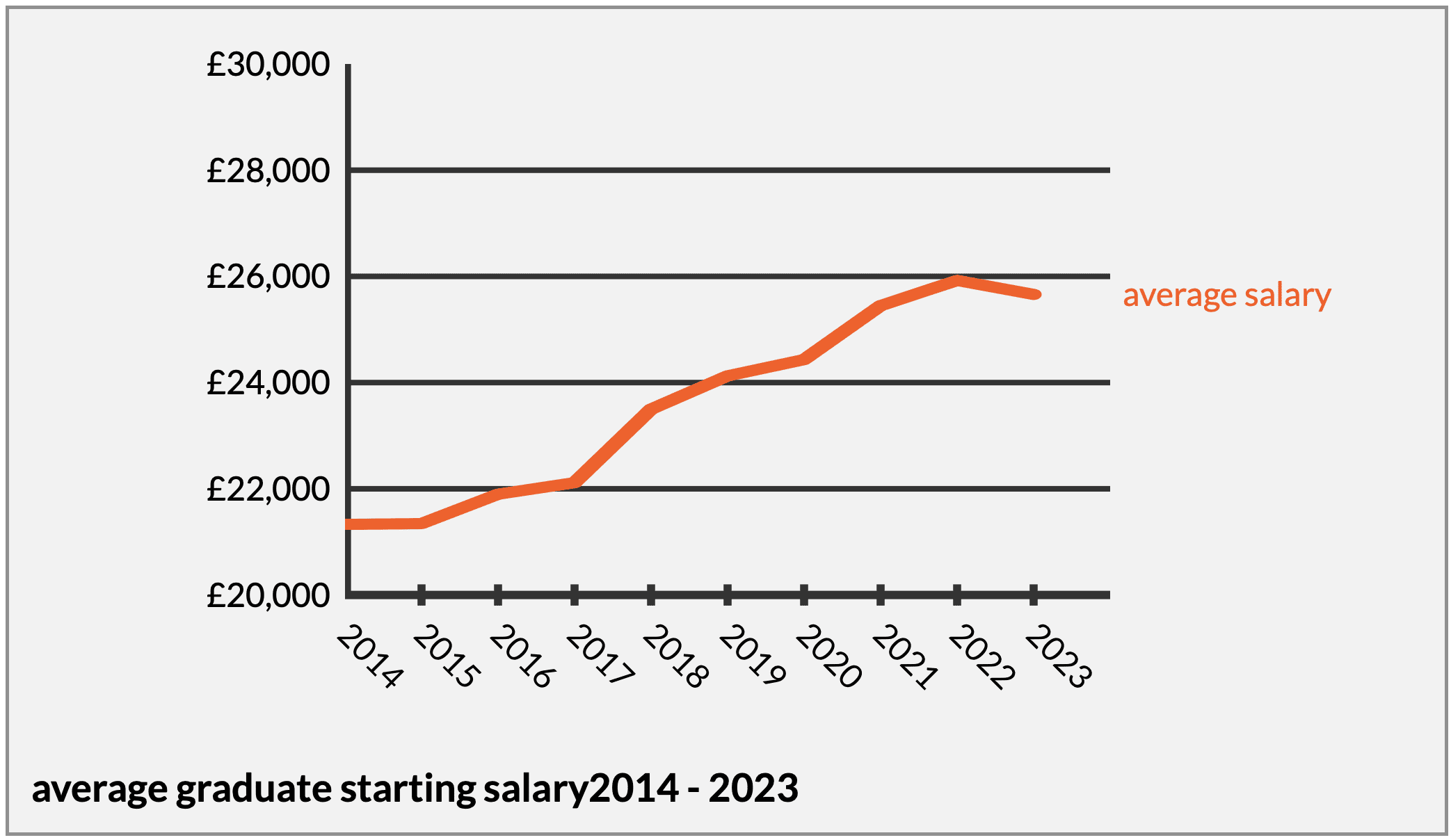
After years of lectures, seminars, essays and exams, graduates want to kick-start a rewarding career. You don’t want to have racked up student loans for nothing and once university is over, it’s time to look for a role that suits your personality and rewards you well.
The graduate job market is relatively stable at the moment with plenty of opportunities on offer. With the current rate of inflation, businesses are also upping graduate salaries to attract the best talent. So what can you expect to be earning as a new graduate in 2023?
As a graduate recruitment consultancy, we have the pleasure of offering jobs to graduates every week. We’ve assessed the average graduate starting salaries that we’ve seen so far this year and the average for our graduates is £25,000 (up from £24,400 in 2022). Naturally, the starting salary that you can expect does vary based on the type of role you apply for, the location it is based in and the experience you already have. For example, graduates working in London should expect to receive a higher salary, we’re seeing graduate salaries for London at around £27,000.
We’re pleased to see that the majority of our graduates also have their salaries reviewed and increased within 6 months of starting their roles.
Search and apply for our graduate jobs here >
Leading graduate job board, graduate-jobs.com, estimates the average starting salary for graduates in 2023 is £25,660. This is based on the hundreds of graduate roles that they see being advertised on their site over the past year.
They’ve also created a graph of realistic starting salaries based on the whole market using their salary data from the past 10 years.
 What the research says
What the research saysHigh Fliers’ research suggests that the average starting salary for graduates in the UK is £30,000 and this figure has not changed since 2015. However, given their research only covers the largest graduate employers in the UK, this figure will only apply to a small minority of graduates.
Related Article: Top 100 Graduate Employers: The Real Truth
It’s important for graduates not to let their salary expectations be skewed by research figures like these. While it would be fantastic if all graduates could start on a £30K wage, this may not be realistic. If you set your salary expectations too high, you may miss out on job offers for not being very commercially aware and you may pass up on opportunities that have greater earning potential in the future.
If you aren’t starting your graduate job on a £30,000 salary don’t conclude that it isn’t a reflection of your value or potential value in the market. Remember, with the right opportunity, you’ll have a good chance at progressing and boosting your salary relatively quickly.
| Sector | Salary(GBP) |
|---|---|
| Accounting | £25,600 |
| Advertising & PR | £24,425 |
| Architecture & Construction | £24,872 |
| Arts & Design | £24,357 |
| Banking | £29,642 |
| Buying & Merchandising | £26,118 |
| Charities | £26,397 |
| Computing & IT | £27,737 |
| Consultancy | £27,475 |
| Customer Service | £25,600 |
| Distribution & Logistics | £26,003 |
| Education & Teaching | £21,598 |
| Energy & Utilities | £26,583 |
| Engineering | £25,560 |
| Environmental | £26,804 |
| Finance | £26,610 |
| Food & Drink & Catering | £24,873 |
| Health | £26,268 |
| Human Resources | £25,262 |
| Insurance | £26,227 |
| Internet & Digital Media | £30,437 |
| Languages | £28,876 |
| Legal & Law | £26,701 |
| Management | £29,040 |
| Manufacturing & Production | £25,852 |
| Marketing | £28,719 |
| Media | £26,059 |
| Military & Defence | £26,468 |
| Property | £24,559 |
| Public Sector | £23,792 |
| Recruitment | £26,374 |
| Research & Analysis | £27,275 |
| Retail | £25,915 |
| Sales | £27,447 |
| Science & Technology | £28,007 |
| Secretarial & Business Admin | £22,997 |
| Sports & Recreation | £20,413 |
| Telecommunications | £28,635 |
| Training | £24,717 |
| Travel & Hospitality | £20,225 |
What subject you studied at university can also have an impact on the salary you take home afterwards. Take a look at the data below to see how your subject measures up.
| Subject Studied | Graduate starting salary |
|---|---|
| Accounting and Finance | £25,000 |
| Acting | £20,000 |
| Aeronautical and Aerospace Engineering | £28,000 |
| African and Middle Eastern Studies | £29,000 |
| Agriculture and Forestry | £23,000 |
| American Studies | £24,000 |
| Animation | £22,000 |
| Anthropology | £23,500 |
| Archaeology | £20,100 |
| Architecture | £22,000 |
| Art and Design | £21,800 |
| Artificial intelligence | £29,100 |
| Asian Studies | £25,000 |
| Astrophysics | £25,000 |
| Biological Sciences | £23,700 |
| Biomedical Sciences | £24,900 |
| Building | £27,000 |
| Business and Management Studies | £25,400 |
| Celtic Studies | £24,900 |
| Chemical Engineering | £30,000 |
| Chemistry | £25,000 |
| Childhood and Youth Studies | £21,000 |
| Chinese | £24,100 |
| Civil Engineering | £27,000 |
| Classics | £24,000 |
| Communication and Media Studies | £21,500 |
| Complementary Medicine | £30,000 |
| Computer Science | £28,000 |
| Counselling, Psychotherapy and Occupational Therapy | £24,900 |
| Creative Writing | £20,500 |
| Criminology | £22,800 |
| Dentistry | £38,600 |
| Diagnostic Radiography | £25,000 |
| Dietetics | £25,000 |
| Drama, Dance and Cinematics | £22,000 |
| Ecology | £20,000 |
| Economics | £29,500 |
| Education | £24,400 |
| Electrical and Electronic Engineering | £28,000 |
| English | £23,000 |
| Fashion | £20,500 |
| Film Making | £21,000 |
| Food Science | £24,900 |
| Forensic Science | £21,200 |
| French | £25,000 |
| General Engineering | £29,000 |
| Geography and Environmental Science | £24,500 |
| Geology | £23,500 |
| German | £25,000 |
| Health Studies | £24,000 |
| History | £24,900 |
| History of Art, Architecture and Design | £23,000 |
| Hospitality and catering | £23,500 |
| Human Resources Management | £24,000 |
| Iberian Languages | £25,000 |
| Information Technology and Systems | £25,000 |
| Italian | £25,000 |
| Journalism | £21,000 |
| Land and Property Management | £25,400 |
| Law | £22,000 |
| Linguistics | £24,000 |
| Manufacturing and Production Engineering | £28,000 |
| Marine biology | £20,000 |
| Marketing | £23,000 |
| Materials Technology | £26,600 |
| Mathematics | £28,000 |
| Mechanical Engineering | £28,000 |
| Medical Technology and Bioengineering | £25,000 |
| Medicine | £35,000 |
| Midwifery | £25,000 |
| Music | £21,000 |
| Neuroscience | £25,000 |
| Nursing | £24,400 |
| Nutrition | £24,000 |
| Optometry, Ophthalmics and Orthoptics | £17,000 |
| Paramedic Science | £24,900 |
| Pharmacology and Pharmacy | £31,000 |
| Philosophy | £25,000 |
| Physics and Astronomy | £28,000 |
| Physiotherapy | £24,900 |
| Podiatry | £25,000 |
| Politics | £26,000 |
| Prosthetics and Orthotics | £25,000 |
| Psychology | £22,500 |
| Robotics | £28,000 |
| Russian and East European Languages | £25,000 |
| Social Policy | £24,000 |
| Social Work | £29,000 |
| Sociology | £23,000 |
| Spanish | £25,000 |
| Speech and Language Therapy | £24,900 |
| Sports Science | £23,000 |
| Statistics | £30,000 |
| Theology and Religious Studies | £24,400 |
| Therapeutic Radiography | £24,900 |
| Tourism, Transport, Travel and Heritage Studies | £22,000 |
| Town and Country Planning and Landscape Design | £25,000 |
| Veterinary Medicine | £31,000 |
| Youth Work | £22,000 |
| Zoology | £20,700 |
Copyright Complete University Guide © 2022
Overall Average: £24,833
Earning plenty of money is great, however, there’s no point in earning £30,000 a year if you dread going to work every day. It’s important to find the balance between what you enjoy, what you earn and the other benefits on offer.
What’s important is different for each of us, so try to make the best decision for you. If you change your mind later, you can always learn from your mistakes and look for a graduate role that is better suited to you going forward.